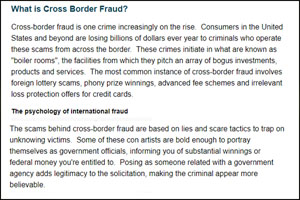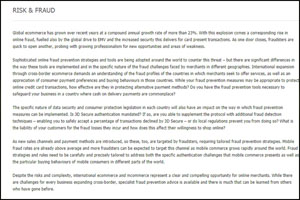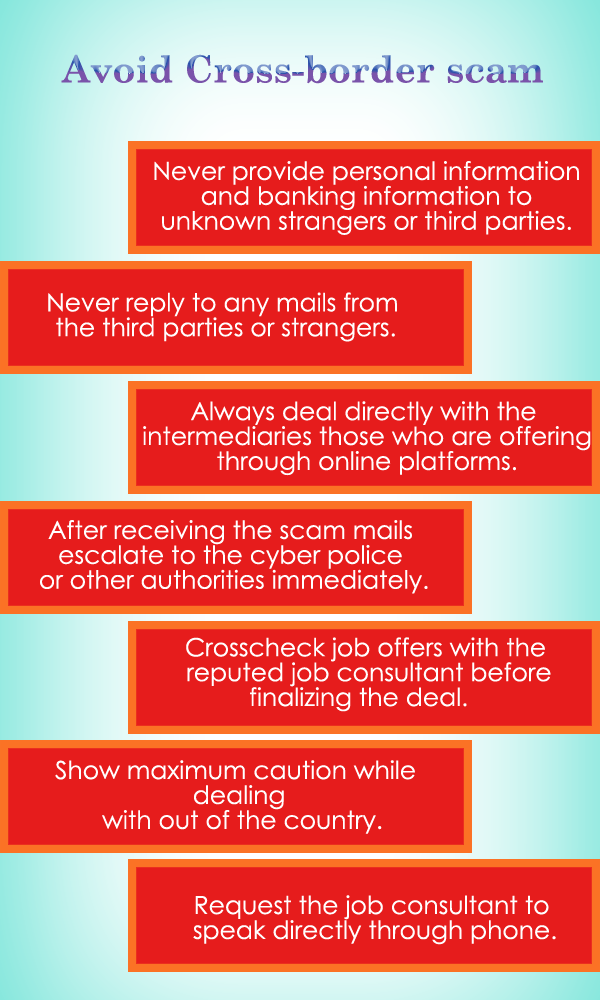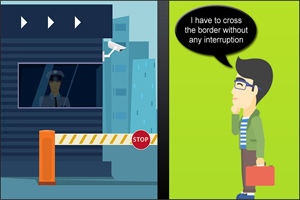Cross Border Scams

Most of the scammers operating from third-world countries and other far-flung regions are think tanks and operate intelligently to cheat commoners. But intelligent people often escape their notice and never share their personal information. Only innocent people fall victim to these criminal networks operating from different countries. Scams related to cross-border issues, especially fees for job offerings, are gaining momentum. Hundreds of construction workers who were working in various construction divisions in Hong Kong lost nearly HK$900,000 to job racketeers. Scammers operating from the Philippines sent emails to civil workers, promising jobs for everyone in their country. Innocent civil workers believed the scammers' words and paid the deposit amount requested by these clever fraudsters. After receiving a total of HK$900,000, they disappeared into thin air. The public is warned not to reply to emails received from scammers or strangers operating from different countries.
Cross-border scams exploit the complexities of international transactions and communication, targeting individuals and businesses across different countries. One prevalent form involves online purchases where fraudulent sellers offer goods or services on e-commerce platforms, receiving payments but failing to deliver the promised items. Romance scams transcend borders as scammers forge online relationships, fabricate crises, and persuade victims to send money internationally. Fake job offers also prey on job seekers seeking opportunities abroad, requiring payments for fake expenses. Investment scams promise high returns but result in financial losses for victims who invest in fake companies or schemes. Customs and tax scams involve impersonating authorities, pressuring victims to make immediate cross-border payments to avoid supposed legal consequences. Advance fee fraud lures victims with promises of significant benefits in exchange for upfront payments, and tech support scams exploit international dimensions to deceive individuals about non-existent computer issues. To avoid falling victim to these cross-border scams, individuals should conduct thorough research, be cautious in online relationships, avoid upfront payments, use secure payment methods, and report suspected scams to relevant authorities.
Cross-border scams refer to fraudulent activities that involve perpetrators operating in one country while targeting individuals or entities in another. These scams take advantage of international borders, making it challenging to track down and prosecute the culprits. Here are some common types of cross-border scams:
Online Purchase Scams: Fraudsters may set up fake online stores or auction listings, targeting buyers from different countries. They often promise products at very low prices, only to take the money and never deliver the goods.
Romance Scams: Perpetrators develop fake romantic relationships with individuals in other countries, gaining their trust before inventing a crisis that requires financial assistance.
Lottery or Prize Scams: Victims are informed that they have won a lottery or prize, but to claim it, they need to pay various fees or expenses. These scams often target individuals internationally.
Tech Support Scams: Scammers pose as technical support agents, claiming to help with computer issues. They convince victims to grant remote access, then steal sensitive information or charge for unnecessary services.
Customs and Tax Scams: Fraudsters impersonate customs officials or tax agencies, claiming that the victim owes fees or fines for cross-border shipments or transactions.







